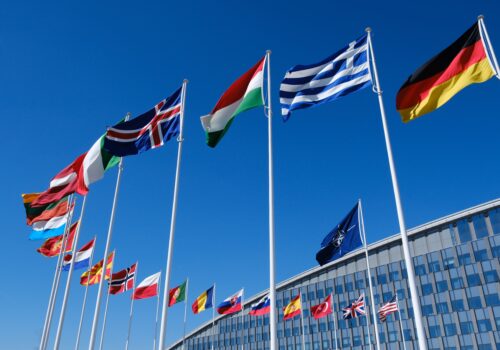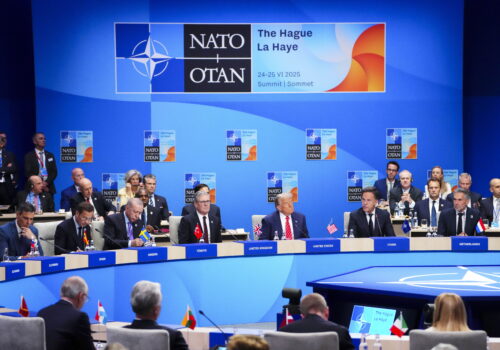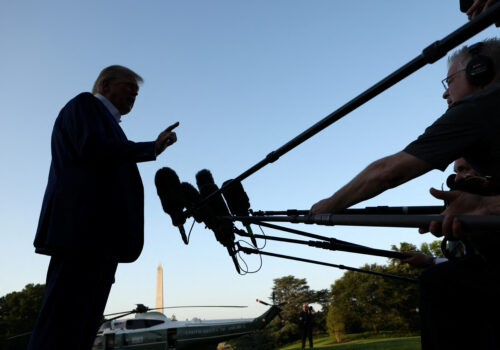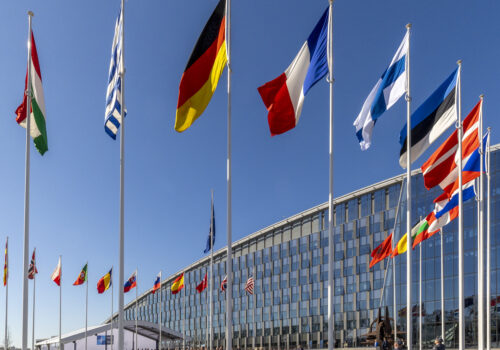Dispatch from The Hague: It’s been Trump’s week in Europe and Iran
THE HAGUE—It’s been a confounding week for President Donald Trump’s harshest critics.
First, his audacious and devastating strikes on Iranian nuclear sites over the weekend demonstrated that he is a calculating risk-taker willing to override his administration’s isolationists. In doing so, he grasped a generational, “America first” opportunity to keep a dangerous regime from acquiring devastating weapons.
Second, Trump answered those who have considered him an existential threat to the world’s most successful and enduring security alliance, which in the past he has derided as a collection of freeloaders perhaps not worth defending. On Wednesday, however, he sealed a deal among NATO’s thirty-two members to dramatically increase their defense and defense-related spending to 5 percent of gross domestic product over the next ten years. Then he waxed poetic about his summit experience alongside allies during an hour-long press conference.
“I came here because it was something I’m supposed to be doing,” said Trump to the media, who know both that he hates multilateral gab fests and that he walked out of the Group of Seven (G7) meeting in Canada just a few days earlier. But he then added that he would leave The Hague “a little bit differently. I watched the heads of these countries get up, and the love and the passion they showed for their country was unbelievable. I’ve never quite seen anything like it.”
Trump—the vilifier of European deadbeats on defense and crusader against allies for what he sees as unfair trade practices—sounded like an altered man. “I left here saying those people really love their countries,” said Trump. “It’s not a rip-off. And we’re here to help them protect their country.”
One ought not to leave out a “to-be-sure paragraph” in a piece that harsher analysts could label naïve in prematurely praising Trump on the Iran strike, from which the dust hasn’t yet settled, and a NATO deal that still requires execution.
To be sure, we don’t yet know that Iran’s nuclear capabilities were destroyed or that its ambitions to destroy Israel and build a bomb are in any way altered. To be sure, moreover, we also don’t know whether these NATO spending pledges will become reality, or whether they will produce the needed capabilities amid sclerotic bureaucratic procedures and national politics.
However, when one weighs the past week’s alternatives, ranking them from worst to best in Iran and at NATO, it’s hard to argue this hasn’t been a good week on both fronts. Iran’s triple threat has been fundamentally weakened—its murderous proxies, its ballistic missiles, and now its nuclear capabilities. Regarding NATO, with its landmark decision on spending, the Alliance didn’t just meet the moment—it may have redefined its future.
Until recently, it was hard to see anything but existential danger to the Alliance: political complacency, fiscal fatigue, transatlantic distrust, and revanchist Russian determination. That’s been recast this week as an opportunity to rearm with urgency, to reimagine collective defense for a digital and artificial intelligence–driven age, and to re-affirm the West’s resolve to support Ukraine in a world where Russia has been betting on democratic decay and indecision.
At an Atlantic Council lunch this week in The Hague, which was attended by senior NATO and country officials, the mood was mostly optimistic. Although all those attending understood how difficult it would be to turn new financial commitments into real capabilities that would deliver security, they knew that the mercifully short five-paragraph summit communiqué was a best-case outcome.
“This is a generational summit,” said Minister of Foreign Affairs for North Macedonia Timčo Mucunski, who at age thirty-five believes as a new NATO member that he’s laying the ground for the Alliance’s future. (The lunch was off the record, but some attendees agreed to allow me to publish their comments.) He conceded that selling such a sharp spending increase would be difficult politically, but he added that it was better to spend 5 percent on defense now than 30 percent later in the case of a conflict.
“It is a historic day,” NATO Deputy Secretary General Radmila Šekerinska said. “It is a colossal commitment that thirty-two countries have made. It is a game-changer.” The capabilities for air defense alone, she added, will increase five-fold through the new funding.
What connects the events in Iran and the NATO Summit is that they won’t be remembered for the threats countered but rather for the opportunities seized, a rare moment in Western leadership these days.
From an existential danger to NATO, the United States and its allies crafted a generational opportunity to rearm and recommit. Cynicism might be warranted, but set it aside for another time. For today, savor the promise of The Hague.
Frederick Kempe is president and chief executive officer of the Atlantic Council. You can follow him on X: @FredKempe.
This edition is part of Frederick Kempe’s Inflection Points newsletter, a column of dispatches from a world in transition. To receive this newsletter throughout the week, sign up here.
Further reading
Wed, Jun 25, 2025
Experts react: NATO allies agreed to a 5 percent defense spending target in a low-drama summit. Now what?
New Atlanticist By
The Alliance summit was notable for what was said and done, especially about defense spending—but also for what was left off the agenda.
Tue, Jun 24, 2025
Dispatch from The Hague: How Trump can build on his Middle East success with NATO
Inflection Points By Frederick Kempe
As the Alliance summit begins, the US president can already justifiably trumpet three major achievements in the Middle East. Will he add one more in Europe?
Mon, Mar 31, 2025
Why NATO’s Defence Planning Process will transform the Alliance for decades to come
Issue Brief By
NATO’s successes over the last seventy-six years are the result of constant adaptation, and the Alliance is now going through its most profound changes since the end of the Cold War.
Image: US President Donald Trump speaks at a press conference, as Secretary of Defense Pete Hegseth stands, at the NATO summit in The Hague, Netherlands, June 25, 2025. REUTERS/Brian Snyder



